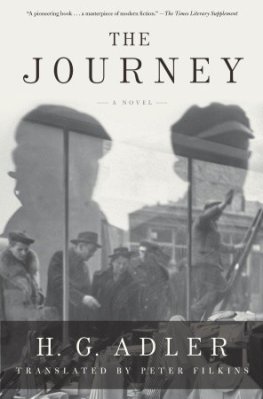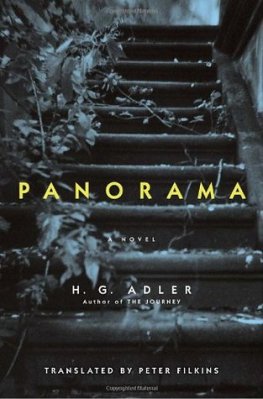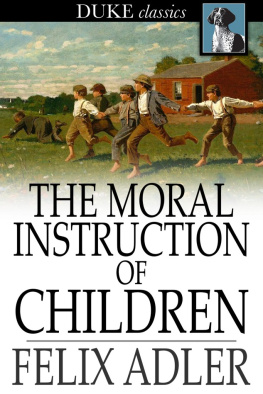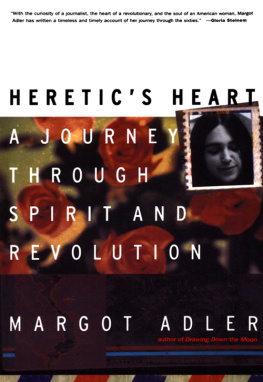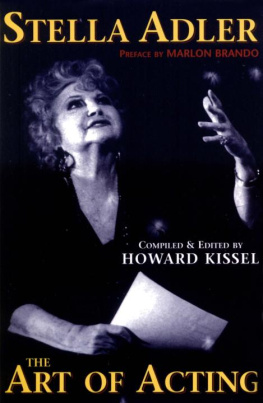THE GERMAN TEXT FOR THE NOVEL IS TAKEN FROM THE 1999 REISSUE OF EINE Reise by Zsolnay Verlag, which in turn was printed from the plates for the original version, published in 1962 by bibliotheca christiana.
A segment of the translation was published in Literary Imagination, whose editors I wish to thank. In addition, I am deeply grateful to the American Academy in Berlin for a Berlin Prize Fellowship, without which this translation would never have been possible. I am also grateful to Bard College at Simons Rock for a sabbatical leave, and to the Austrian Society for Literature and the Ministry for Education, Arts, and Culture for research grants. My thanks also go to Jeremy Adler for his many patient replies to questions, to Philip Bohlman for his support and friendship, to Bernie Rodgers for reading an early draft, to Tess Lewis for her suggestions, to Chris Callanan for his resourceful help with queries, to Susan Roeper for being there throughout, and to my editor at Random House, Paul Taunton, who appreciated the novels import from the start.
It seems unpardonable today that I had blocked off the investigation of my most distant past for so many years, not on principle, to be sure, but still of my own accord, and that now it is too late for me to seek out Adler, who had lived in London until his death in the summer of 1988, and talk to him.
W. G. SEBALD, Austerlitz
IF THERE WERE A DEFINING EXAMPLE OF A LOST WRITER, IT WOULD HAVE to be H. G. Adler. Born in Prague in 1910, he grew up in a secularized Jewish family and later studied musicology at Charles University in Prague, where he wrote a thesis on Klopstock und die Musik, completed in 1935. Like so many of his generation, however, his dream of becoming a professor and writer was soon postponed. Though he made attempts to emigrate before the Germans marched into Czechoslovakia, visas were difficult to come by, circumstances ever changing and confusing, the needs of family and friends too pressing to ignore. Adler was still in Prague when the Nazis arrived in 1939, and after marrying Gertrud Klepetar he was transported with her and her parents to Theresienstadt on February 8, 1942, where he immediately began taking notes for what would become his groundbreaking study, Theresienstadt 19411945, which he would publish in 1955 to wide acclaim. Adler and his wife spent two and a half years in Theresienstadt, which Adler called a Zwangsgemeinschaft, a slave community set up by the Nazis to cleanse the Reich of Jews in exchange for their safe passage and the worldly goods they were forced to leave behind. There his wifes father died, while later in Auschwitz, Gertrud would join her mother on the bad side as they came off the train in order that she not die alone in the gas chambers. Adlers own mother and father would also meet their deaths in other camps, a total of eighteen family members eventually disappearing into the horror.
As with so many survivors, a combination of good health, sharp wits, and pure luck saved Adler himself. After spending two weeks in Auschwitz he was transported to Niederorschel, a neighboring camp of Buchenwald, and eventually to Langenstein, where he worked in a factory that made sheet metal for airplanes. It was there that he was liberated by American troops on April 13, 1945, returning to Prague on June 20, barely alive. Eventually he regained his health and, after the Soviets moved in, emigrated to London in 1947, where he reunited with a childhood sweetheart, married, and had a son. However, he also remained an exile for the rest of his life, and died in 1988 after having published twenty-six books of poetry, fiction, philosophy, and history, as well as more than two hundred articles and essays on the Holocaust, Jewish history, literature, and philosophy. Never resting, never settling in any one field or genre, Adler described himself simply as a freelance writer and teacher, preferring to approach his subject matter through both literature and social science in order to carefully detail what hed experienced, as well as render it in art so that it could be imagined by others.
Though its customary to begin with the basic biographical outline when introducing an author, in the case of H. G. Adler its absolutely necessary. Despite those twenty-six books and numerous articles and essays, his name hardly ever appears in the standard works on the Holocaust. You will not find him listed in most encyclopedias of Holocaust writers, nor do most critics of Holocaust literature discuss his writing. Glancing mention is made here and there of his monograph on Theresienstadt, as well as his 1974 study of the systematic structures that set the Holocaust in motion, Der verwaltete Mensch (Administered Man). Almost nowhere, however, will you find mention of his poems or stories, nor of the six novels he wrote, four of which were published in his lifetime, receiving heartfelt praise from the likes of Heinrich Bll, Heimito von Doderer, and Elias Canetti. Though W. G. Sebald discusses Adlers work on Theresienstadt in the climactic twenty pages of his novel Austerlitz, and a 2004 issue of Germanys Text+Kritik focused on his entire career, Adler lived to face deep neglect amid the corrosive waves of time, ending up a man who set down his story in numerous works and genres only to see it lost before his very eyes. Only the recent republication of his novels and monographs has begun to bring the kind of attention they deserved in his lifetime.
How could this have happened? What is it about Adler or his work that could have led to such demise? Part of the answer lies in the mundane quirks of publishing, another part in the times in which he lived and wrote. Though Adlers monograph on Theresienstadt received critical acclaim as well as the Leo Baeck Prize, his literary works were either published by very small publishers unable to support them with the proper distribution, or not published until years after they had been written. Eine Reise (which I prefer to call The Journey, Die Reise being the title Adler gave it when he wrote it in 195051) was not published until 1962. Peter Suhrkamp of Suhrkamp Verlag went so far as to say that as long as he was alive the book would never be published in Germany. Indeed, Suhrkamp died in 1959 and the book appeared from a tiny publisher three years later. Meanwhile, Panorama, Adlers first novel, written in 1948, was not published until 1968, while Die unsichtbare Wand (The Invisible Wall), written in 195456, did not appear until 1989, a year after Adlers death. Two other novels have never been published at all.
Beyond bad luck and the quirks of publishing, something else was afoot during Adlers career, for one can perhaps hear the wall of resistance he confronted in Peter Suhrkamps categorical ban. The times were not ready for Adler, nor was he at ease with them. As we know, Theodor Adornos famous pronouncement that literature was no longer possible after Auschwitz was the accepted critical opinion of the day. Adler and Adorno corresponded, and it was on this position that they came to deep disagreement. Adler believed it not only possible to write poetry and literature after Auschwitz but that it was necessary, for only with the full engagement of the imagination would it be possible to elicit even a glimmer of the true nature of what had been suffered and, yes, survived. Adornos view, however, carried the day, especially with the generation of writers, editors, and publishers who controlled the production of literature in German after the war.* Add to this Adlers exile in London, a condition that condemned him to a life lived on the periphery, and one can appreciate what it must have felt like to disappear in plain view, the irony being that this was the very same sentence that he, like millions of others, had seen carried out much earlier.

